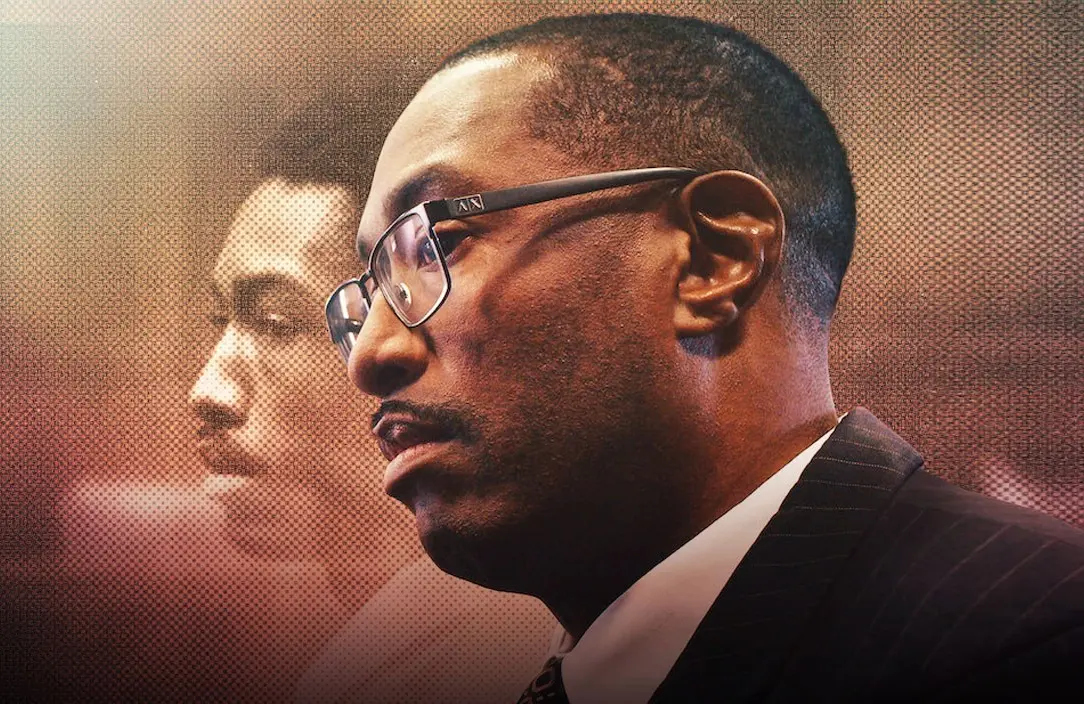Netflix's Trial 4 Tells Yet Another Troubling Tale of Police Corruption
-
 Then and now: Sean Ellis spent 22 years defending himself against a murder he didn't commit. (Photo: Netflix)
Then and now: Sean Ellis spent 22 years defending himself against a murder he didn't commit. (Photo: Netflix)In Philadelphia, the rapper Meek Mill was bottled up in the criminal justice system for years by a judge who enjoyed jerking him around. In New York, innocent kids were ticketed and jailed continuously as cops scrambled to meet quotas that NYPD officials denied the existence of. Across middle America, people are rotting in jail because they confessed to crimes allegedly of their own volition on videotape.
What all of these travesties have in common — besides the outstanding programs made about them — is that the people ultimately responsible were so insulated from accountability that they held near-absolute power. Their superiors, unions, elected officials, and local news media all had their backs. Everyone bought into the idea that police needed complete trust and loyalty to do their jobs and keep chaos at bay. It was a recipe for shabby prosecutions, mass incarceration, Eric Garner, Sandra Bland, George Floyd — a different kind of chaos, the kind you find in countries where the police are the law unto themselves.
And, as we learn in the riveting eight-part docuseriesTrial 4, it produced a Boston homicide division that still denies the depths of its racism, corruption, and ineptitude, even when Pulitzer-winning reporters and Oscar-winning filmmakers present the undeniable facts. At the end of one of the episodes of Trial 4, a long list of names appears — everyone of interest who refused to speak on camera about the case of Sean Ellis. Why should they? Ellis did the crime, Boston police did their job, move on, nothing to see here.
Sean Ellis was a 19-year-old man in 1993 when he found himself in the wrong place at the wrong time. That night, a cop named John Mulligan had been killed execution-style in his car while working security at a drugstore. Ellis, who had gone to the same store hours later to pick up diapers, was quickly charged with the crime. It was the most sensational murder in Boston since a white woman was shot in 1991 while sitting next to her husband in a car in an all-Black neighborhood. Police went wild tearing up apartments and arresting the usual suspects before the husband confessed to setting up the hit. You would think that such a huge embarrassment would have slowed the rush to judgment this time, especially given the scanty evidence linking Ellis to Mulligan’s killing. But you would be wrong.
I’m not spoiling anything by telling you that Trial 4 refers to the fact that Sean Ellis was tried four times for the crime. Meanwhile, he sat in jail for 22 years. But that’s what happens when an untouchable institution refuses to admit even the possibility of error, or that a clearly innocent man could’ve been convicted for killing a cop who was far from innocent himself.
I was excited to watch Trial 4 because it’s the first thing I’ve seen in over a decade from co-directors Rémy Burkel and Jean-Xavier de Lestrade, whose suspenseful style has resulted in some of television’s finest true-crime productions: their 2002 Oscar winner for HBO, Murder on a Sunday Morning, their probing look at Las Vegas’ criminal justice system, Sin City Law — sadly, neither of these is available to stream — and their masterful years-in-the-making whodunit The Staircase, which you can watch on Netflix. These directors do not disappoint. We meet the reporters, lawyers, family members, and advocates who eventually come to Ellis’ aid, and we get to know this sensitive young man whose spirit the criminal justice system tried its best to snuff out, and fortunately failed.
Trial 4 drops on Netflix today, November 11th
Aaron Barnhart has written about television since 1994, including 15 years as TV critic for the Kansas City Star.
TOPICS: Trial 4, Netflix, The Staircase (2004), Jean-Xavier de Lestrade, Rémy Burkel